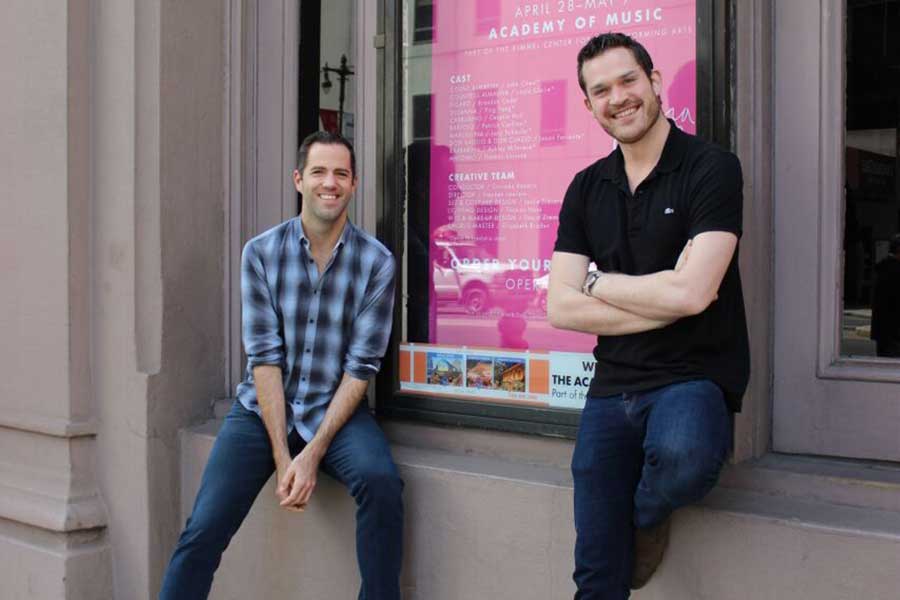The character of Figaro is one of the most finely detailed and renowned in operatic literature. As essayed first by playwright Pierre Beaumarchais in his comedies “The Barber of Seville,” “The Marriage of Figaro” and “The Guilty Mother,” the rakish, witty Figaro is smarter and sharper than his class would (or rather, should) allow, he being the valet to Spain’s Count Almaviva, governor of Andalusia. As a shrewd modish up-market major-domo, Figaro is slyly acerbic and ready with the most cutting and knowing of retorts. It is, however, his role as fiancé to Suzanne — Countess Rosine’s maid — that shows Figaro as a tender, coy and cool romancer.
This weekend, Opera Philadelphia unveils its opulent take on Mozart’s “The Marriage of Figaro” with conductor Corrado Rovaris and director Stephen Lawless at the helm, and Philadelphia native Brandon Cedel — an out bass-baritone who graduated from the Curtis Institute of Music — as the titular soon-to-marry Figaro. Oddly enough, Cedel’s live-in boyfriend and fellow Curtis Institute grad (they live in Germany now) Jonathan Beyer, a baritone, played the very same role in Opera Philadelphia’s 2014 take on Rossini’s “The Barber of Seville.” Go figure.
One could hardly expect the twosome to talk of anything except opera.
“Well, that would be all well and good if it wasn’t for the fact that we do actually talk about it more often than you think,” said Beyer with a laugh, before he mentioned how the dueling pianists also happen to hang around the house playing four handed-sonatas for fun and relaxation. “We do have an ongoing dialogue, funny or not funny, about doing that same Figaro role, as well as other roles we play.” (Beyer also played the Count in another production of “The Marriage of Figaro.”)
“It’s just one of the great, classic roles,” said Cedel, who called “The Marriage of Figaro” a homecoming of sorts, as he went to school in Hershey, then to Curtis for his undergrad and master’s degrees and met Beyer. He made his professional debut for Opera Philadelphia in “Tosca” in 2011.
“This city has meant a lot to me,” he said.
Beyer grew up in Chicago and wound up at Curtis as a composition major. He joked, “I was so good at composing that I wound up a professional singer instead.”
Both men discuss the original source material from which Figaro came, with Beyer revealing how his Rossini-based character was lighter and more playful than the Mozart-Cedel model.
“I think mine was more playful and fun for the audience to watch, a sillier take,” he said. “There is no romantic subtext for him this time as he’s there to facilitate the relationship between the tenor and the mezzo. Plus when we did that in Philly, the director played up the campy side, made him a hairdresser who gossiped a lot.
“There was, however, the underlying backstory of the class system in there,” for additional snark and smarts, he said.
For the Mozart “Marriage” at the Academy, Cedel noted his Figaro was written for a lower voice, romantic and perhaps sterner, and possibly with a bit of a mean streak about him.
“The characters in this ‘Figaro’ are more serious, often villainous and, at the very least, not comic in any way,” Cedel said. “He is, however, quick and witty with a ready answer for everything. What he lacks in the status of class he was born into, he makes up for in being able to outsmart any of the higher-class people standing next to him.”
Beyer perked up, stating that in “Marriage,” there is much more tension between the Count and Figaro.
“They’re younger and more carefree in Rossini’s eyes.”
The pair — who will head back to Germany, as Beyer starts work on dark, modernist opera “South Pole” as soon as “Figaro” is done — doesn’t really compare one’s personal Figaro to the other, as each is so radically different in tone and tenor.
“There’s no ‘Who does it better?’ but rather, because we are both singers from the same school with the same teachers, we can talk about the ideas that a director or conductor has in regard to the characters because we have been through that and continue to do so,” Cedel said. “It’s nice because we can just bounce off each other.”
Beyer added he has watched his partner make this version of the Figaro role his own.
“I have watched and listened to him making this role suit his voice, a real job as the last gig he had was the lighter La Parello in ‘Don Giovanni,’ with a different feel than Figaro. It’s been nice hearing him get Figaro in the back of his throat. That’s what’s great about living with a singer: watching and hearing each other grow, exchanging ideas and preparations.”
“The Marriage of Figaro” runs April 28-May 7 at the Academy of Music, 240 S. Broad St.
